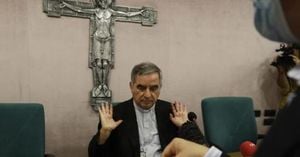Daredevil: Born Again continues to captivate audiences with its exploration of vigilante justice through the narrative of Hector Ayala, also known as White Tiger, portrayed by the late Kamar de los Reyes. The series reintroduces Matt Murdock (Charlie Cox), who is attempting to navigate his dual identity as both one of New York City’s most skilled lawyers and its notorious vigilante, Daredevil.
The show, which streams on Disney+, centers around moral dilemmas faced by characters embroiled in the often murky waters of justice and corruption, currently embodied by Wilson Fisk (Vincent D’Onofrio), who has recently claimed the role of New York City’s mayor. His controversial win has immediately shifted the political atmosphere, as Wilson’s inaugural speech turned the spotlight to vigilantes—condemning figures like Daredevil, the Punisher, and even Spider-Man, who, due to Sony’s licensing, does not appear directly, but is acknowledged nonetheless.
Episode two of the series, dedicated to the memory of Kamar de los Reyes, features Ayala intervening during a violent act inside the subway, where he witnesses two attackers beating another man. Despite his intentions to help, the confrontation escalates, leading to the death of one assailant when he accidentally falls onto the tracks and is struck by oncoming train. The police officers involved are revealed to be out of uniform, launching Hector headfirst not only against criminal charges but also against the very system meant to uphold justice.
"This is awesome. This is the project Kamar de los Reyes was working on when he fell ill, but he finished it and he was so proud of it. So badass," his wife Sherri Saum celebrated, indicating the important legacy Kamar left with this project. The dedication to the actor highlights the personal loss the cast and crew experienced and pays tribute to de los Reyes' portrayal of the courageous Ayala.
Matt Murdock, having distanced himself from the darker, more violent elements of his life as Daredevil, is compelled to act when he overhears police beating Ayala at the station. The legal defense he provides significantly reflects his commitment to justice, pushing back against corruption actively through the court system, rather than through his alter ego’s skilled combat.
Fisk, meanwhile, is busy solidifying his grasp on his new role. His administration runs parallel to the turmoil faced by Ayala. Despite appearing to aim for reform, Fisk’s methods include backroom deals, cover-ups, and outright intimidation, demonstrating his reluctance to let go of past criminal dealings. One notable scene reveals how Fisk forces the police commissioner through blackmail to support his initiation as the mayor.
Yet the plot thickens when it becomes widely known during the trial of Hector Ayala, where Matt must navigate his defense without letting the jury’s bias against vigilantes dictate the outcome. Murdock insists on keeping Ayala’s identity as White Tiger out of the courtroom, fearing it would unfairly taint the jury’s perspective—drawing from his extensive experience as both lawyer and vigilante.
Further complexity arises when the nature of Hector’s abilities is clarified; unlike their comic book counterpart, who possesses powers due to ancient talismans, Hector’s amulet enhances his capacities but is revealed to have not been worn during the fatal subway incident, complicity leading to dire consequences for him.
The parallels between Murdock and Ayala are deeply woven throughout, creating tension not just within the courtroom but within Murdock himself as well. The moral gray areas wherein both characters dwell allow the show to critically assess the worth of vigilante action, especially when official enforcement becomes corrupt.
Complications escalate as important witnesses begin to go missing, and corrupt police officers, evidenced by the tattoos associated with the Punisher, add another layer of danger to Ayala’s situation and Murdock’s resolute intent to prepare his defense.
The stakes rise as Matt meets with Heather Glenn (Margarita Levieva), his girlfriend, who also finds herself involved in the lives of those she is counseling; coincidentally, she becomes the couples' therapist for Wilson and Vanessa Fisk. This intersection adds tension as Matt recognizes the personal relationships intertwined with his legal fight for justice.
Overall, Daredevil: Born Again has deftly threaded themes of redemption and moral conflict throughout its narrative and pays honor to the late Kamar de los Reyes, whose performance captures the essence of struggle against corruption and the weight of vigilante justice moving through unyielding societal systems.
The series is structured not just as entertainment, but opens up discussions about real-world justice, highlighting the desperate situations faced by civilians, those defined by their communities, who find themselves caught up against systemic oppression and need for real justice—a representation of the underdog against the backdrop of corruption.
With more episodes scheduled for release, fans are eager to see where the storyline leads and how the intertwined destinies of Daredevil, White Tiger, and Fisk continue to play out within the gritty confines of New York City.
New episodes of Daredevil: Born Again premiere on Disney+, with the latest episodes leading viewers through courtroom drama intermixed with thrilling action—all the hallmarks of what makes Marvel’s narrative so engaging.
Expect brisk discussions on the nuances of morality, justice, and the prevalence of authoritarianism peppered between the punches, set against the colorful clashes of well-loved superhero archetypes.



